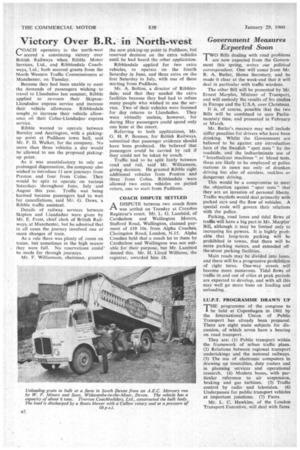Government Measures Expected Soon
Page 36

If you've noticed an error in this article please click here to report it so we can fix it.
TWO Bills dealing with road problems I are now expected from the Government this spring, writes our political correspondent. One will come from Mr. R. A. Butler, Home Secretary, and he made it clear at the week-end that it will deal in particular with traffic wardens.
The other Bill will be presented by Mr. Ernest MarpIes, Minister of Transport, and will embody the results of his studies in Europe and the U.S.A. over Christmas. It is, of course, possible that the two Bills will be combined to save Parliamentary time, and presented in February or March.
Mr. Butler's measure may well include stiffer penalties for drivers who have been drinking. Whilst the Government are believed to be against any introduction here of the Swedish "spot tests" by the roadside, and the indiscriminate use of " breathalyzer machines "or blood tests, these are likely to be employed at police stations in eases not only of drunken driving but also of careless, reckless or dangerous driving, This would be a compromise to meet the objection against "spot tests " that they are an invasion of personal liberty. Traffic wardeds would deal primarily with parked cars and the flow of vehicles. A special code will .govern their. relations with the police. Parking, road lanes and tidal flows of traffic. will have a big part in Mr. Marples' Bill, although it may be limited only to increasing his powers. It is highly probable. that long-term parking will be prohibited in towns, that there will be more parking meters, and extended offthe-street parking facilities. Main roads may be divided into lanes, and there will be a progressive prohibition of right turns. One-way streets will become more numerous. Tidal flows of traffic in and out of cities at peak periods are expected to develop, and with all this may well go more bans on loading and unloading.
PROGRAMME DRAWN UP
THE programme of the congress to be held at Copenhagen in 1961 by the International Union of Public Transport has already been prepared. There are eight main subjects for discussion, of which seven have a bearing on road transport.
They are: (1) Public transport within the framework of urban traffic plans.
(2) Relations between regional transport undertakings and the national railways. (3) The use of electronic computers in drawing up timetables, duty rosters and in planning services and operational research. (4) Modern buses,, with particular reference to air suspension, braking and gas turbines. (5) Traffic control by radio and television. (6) Underpasses for public transport vehicles at important junctions. (7) Fares.
Mr. L. C. Hawkins, of the London Transport Executive, will deal with fares.






































































































